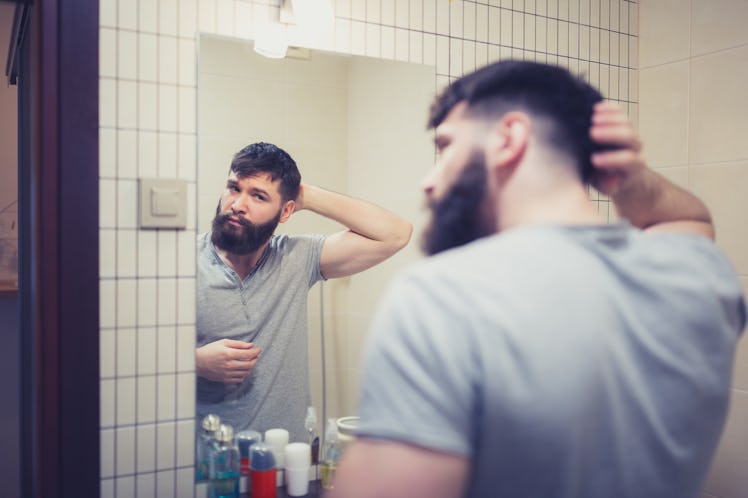6 Ways To Stop Peeing So Much At Night
A urologist explains how to do more sleeping and less pissing.

Men who are concerned about how much they have to pee at night can take comfort in the fact that they’re not alone. About one in every 10 patients urologist Jamin Brahmbhatt, M.D., sees comes in worried about nocturia, the medical diagnosis for excessive urination at night. And although it’s true that an enlarged prostate can cause frequent urination and be a sign of serious trouble, that’s seldom the reason why men find themselves running to the bathroom at 3 a.m.
“A lot of the younger guys just enjoy happy hour a little too much,” Brahmbhatt says. He suspects that, although women often get a reputation for having overactive bladders, men likely experience as many issues but tend to underreport symptoms. Still, most men don’t appreciate wake-up calls from their bladders. If you’re one of them, here are six ways to stop peeing so much at night.
Stop Drinking Liquids Three Hours Before Bed
When you drink liquids three hours before bedtime, your kidneys are going to start filtering that while you sleep, creating more urine, and eventually compelling you to pee. So the easiest solution is to stop ingesting liquids within this window. Since alcohol is a diuretic (meaning that it suppresses the release of anti-diuretic hormones, which help kidneys return water to your bloodstream), it will make you have to piss even more and should be especially avoided in this three-hour window. Brahmbhatt similarly recommends steering clear of foods with a lot of liquid in them, such as watermelon, before bedtime.
Pee Before Bed, Not Before Netflix
It’s important for parents to practice what they preach during nighttime potty training and remember to pee right before going to bed. Although this may seem obvious, Brahmbhatt says the most common mistake people make is urinating when they get ready for bed, even when they won’t be going to sleep until after an hour of podcasts or Netflix. Men should make a point of getting up to pee one more time before actually closing their eyes, Brahmbhatt says, lest they find themselves awake a few hours later.
Cut Back on Sugar
“If patients have really high sugar levels, that can irritate their bladders,” Brahmbhatt says. Cutting back on sugar can also help individuals who are overweight, as added fat gives their bladders less room to expand and increases urgency. On top of that, one symptom of diabetes is excessive urination throughout the day, so cutting back on sugar can curb unwelcome urges to pee in a number of ways.
Do Man Kegels
Kegels aren’t just for the ladies, and clenching and releasing pelvic floor muscles regularly could help men who pee too much. These muscles help to support the bladder and can prevent something you dislike even more than waking up — unexpectedly dribbling. Kegels might also help you take healthier dumps. The best part is that nobody has to know you’re clenching.
Get Your Head Right
Being nervous or anxious can trigger nighttime urination, Brahmbhatt says. Likewise, sleep disorders like sleep apnea can cause many men to mistake urination for why they’re awake so much. So it’s important to rule out potential sleep disturbances and anxiety before blaming your bladder.
“If you’re awake at night and can’t sleep and you’re trying to sleep and you’re bored out of your mind, then going to the bathroom might just be something that keeps your mind occupied,” Brahmbhatt explains.
Go To The Doctor If You’re Concerned
It’s probably not your prostate, but, if urination remains a regular sleep disruption, it’s best to have a medical professional rule it out. When the prostate enlarges, the bladder retains urine and does not fully empty before bed, causing the urge to pee. In some cases, these late-night bathroom trips could be a result of a bladder tumor, scarring from an undiagnosed STI, or another serious health issue.
So while you limit your liquid and sugar intake and work on that pelvic floor, schedule a visit to see your doctor. At the very least, a clean bill of health should help you sleep at night.
This article was originally published on